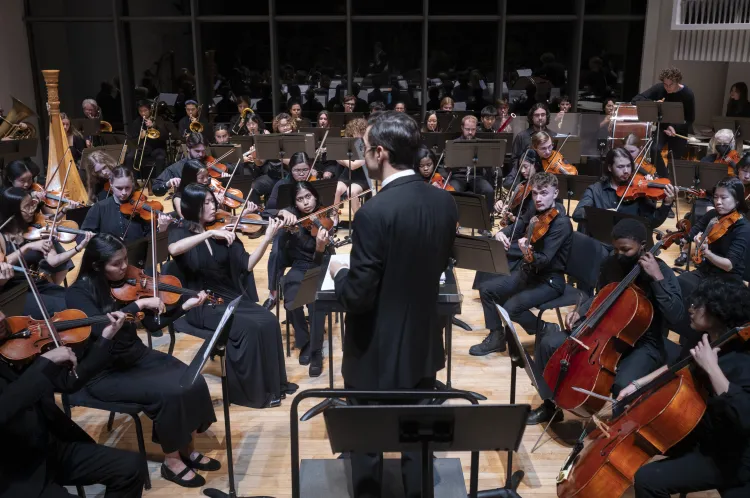The Swarthmore College Orchestra's Spring 2024 Performance

The Swarthmore College Orchestra will perform on Saturday, April 27, at 8:00 p.m. in the Lang Music Concert Hall. This semester’s performance is heavily student centered as it features original works by student composers and a solo from this year's concerto competition winner.
The camaraderie within the orchestra, and particularly within each section, is what makes the ensemble special for so many students. Percussionist Hannah Zhang ‘26 commented on this warm atmosphere, saying “I am having so much fun because I am kind of the newbie of the percussion section even though I’m an upperclassman. There are two [first year students] who have kind of taken me under their wing and helped me with tough passages. [They] are just really welcoming and fun.”
Professor and ensemble director Andrew Hauze ’04 is the heart and soul of the orchestra. He holds the group together, not just through conducting, but by facilitating community among its members. “I appreciate that [Andrew Hauze] sees us as people and lets us take time and space and participate to whatever extent we can given our circumstances,” said violinist Joey Driscoll ‘26.
This semester’s program is unique in that it features two works from senior music students studying composition: Exploration by Mark Reyes ‘24 and Time Flies by Atesh Camurdan ‘24. “It was a joy hearing the orchestra rehearse and refine my piece, and they sound amazing!” Camurdan said.
Presenting student compositions is a remarkable experience for both composer and musician. On performing these pieces, Zhang said, “It’s really cool getting to highlight both the playing talent and the compositional talent on stage.” Professor Hauze commented, “Both [student compositions] have moments of great intensity and high drama that I think are going to be a really exciting way to begin the concert.”
Winner of this year’s concerto competition, Min Fruman ‘24, will feature as a soloist on the fourth movement of Elgar’s Cello Concerto. Professor Hauze remarked that “playing with a soloist requires us to be a much more flexible orchestra, and for everyone to be very alert.” This is especially true of the Elgar Concerto, with its many shifting moods and lots of rubato, or moments where the soloist may speed up or slow down to achieve a certain character in the music. “We want to make sure we are accompanying Min in a way that is sensitive to how they’re interpreting the piece,” Professor Hauze explained.
On working with the orchestra as a soloist, Fruman commented, "[It’s] been one of the most memorable experiences from my time at Swarthmore. The best part about it has been the amount of support I've felt from everyone throughout the whole process, which has really helped me relax and enjoy it as much as possible.” They continued, “I feel so lucky to have found the music community at Swarthmore, and to be able to close this chapter in my cello journey in such a special way.”
Fruman and the orchestra capture many moods and emotions as they move through the Elgar piece, up until the very end when “time stands still,” says Professor Hauze.
The program's final piece, Scheherazade by Nikolai Rimsky-Korsokov, similarly employs various characteristics. “It has pretty much every orchestral sound effect of the late 19th century,” said Professor Hauze. “It’s just so rich and vibrant.” Hauze shared this advice for the audience concerning Scheherazade: “Just watch a particular section of the orchestra, see when they come in and what they’re doing. You will hear how Rimsky-Korsakov has carefully calibrated their contribution to the whole.”
As a final note, Professor Hauze said, “Hearing orchestra music in our concert hall I think is very special because you can hear pretty much everything, the sound is very clear. Hearing live orchestral music, particularly in a fairly intimate space like our concert hall is really important and really exciting.”
The Swarthmore College Orchestra concert takes place Saturday, April 27, at 8:00 p.m. in the Lang Music Concert Hall. The event is free and open to the public, and the Swarthmore community is encouraged to attend.



